17 Sep 2014 | Azerbaijan, Azerbaijan News, News and features, United Kingdom

London-based daily newspaper Metro ran a feature this month extolling the delights of Baku, the capital of Azerbaijan. The photo-driven feature article comes at a time when the government of President Ilham Aliyev is ratcheting up pressure on dissenters, including denying independent news outlets the kind of freedoms that a paper such as Metro, whose parent company is outspoken on the importance of press freedoms, enjoys in the UK.
Despite attempts to present itself to the outside world as a modern and open society — in part through a concerted international PR campaign — Azerbaijan has a woeful human rights record and continues to arrest, detain and harass any opponents to the regime of President Ilham Aliyev. In the last few months, many campaigners and activists have been arrested in an attempt to silence them.
Metro highlighted 10 things to do in Baku. Here we list just five things you need to know about Azerbaijan before you go. We ask our supporters and all those who care about a free press and free expression to draw attention to these so we can counter the whitewash of the Aliyev regime.
There is an ongoing crackdown on government critics

A number of high profile Azerbaijanis known for their criticism of authorities have been jailed in a matter of weeks. These include human rights activists Leyla and Arif Yunus and Rasul Jafarov, human rights lawyer Intigam Aliyev and journalist Seymur Hezi. This new wave of repression followed the jailing of two human rights defenders who lead the only independent group monitoring elections in Azerbaijan.
Independent media is silenced
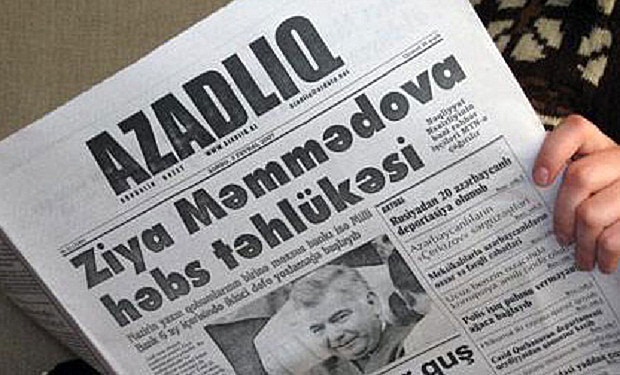
Azerbaijan’s last independent newspaper Azadliq, which was named 2013 Guardian Journalism award winner at the Index Freedom of Expression awards in March 2014, was forced to suspend printing in July because of financial pressures from the government. This is a familiar pattern for Azerbaijan’s critical press, which has long been subjected to an array of attacks. Independent news outlets face economic sanctions and are often barred from distribution networks. Journalists are also victim to legal threats. In the first six months of 2013, 36 defamation suits were brought against media outlets or journalists. Award-winning investigative journalist Khadija Ismayilova was subjected to an aggressive smear and blackmail campaign in retaliation for her coverage of government corruption and continues to be targeted by authorities.
Internet users are targeted
Ahead of last year’s election Azerbaijan extended penalties for criminal defamation and insult to cover not just traditional media, but also online content, including social networks. The potential length of pre-trial detention has increased from 15 to 90 days. In May, a university student and member of the Free Youth organisation, was arrested for a Harlem Shake video posted on YouTube. A human rights defender was sentenced to four years in jail on hooliganism charges after posting videos on YouTube containing interviews with victims of a gang they alleged had connections to local police officers. A freelance journalist who was outspoken in his criticism of the government on social media was given a four-and-a-half-year prison sentence on charges that included appealing for mass disorder.
Artists are censored
Despite the fact that Azerbaijan has committed to respect and protect artistic freedom of expression, authorities restrict this right. This is especially the case for alternative artists and those deemed to be critical of the government, whose ability to perform, display, or disseminate their work is limited. Self-censorship is one consequence of this, with many artists shying away from producing critical or controversial work for fear of the possible consequences. Musician Jamal Ali, who has spoken out against President Aliyev, was allegedly tortured by the police.
Democratic principles are ignored

Current president Aliyev has been in power since 2003, when he took over from his father Heydar, and in 2009 he removed term limits for the presidency. According to the international observer mission, the October 2013 election “was undermined by limitations on the freedoms of expression, assembly and association”, with “significant problems” observed throughout election day. The 2003 and 2008 votes also failed to meet international standards. Transparency International has called Aliyev’s government the most corrupt in Europe. Meanwhile, authorities have engaged in a wide-reaching international PR campaign. In 2012, the country was given a chance to project a positive image to the world through hosting the Eurovision Song Contents. Preparations included urban renewal programs that saw homes demolished and families evicted. It remains to be seen what will happen next year, when the inaugural European Games come to Baku.
This article was published on Wednesday 17 Sept 2014 at indexoncensorship.org
5 Sep 2014 | Azerbaijan, Azerbaijan News, News and features

Seymur Hezi, a reporter working for Azadliq, Azerbaijan’s last independent newspaper, was sentenced to a two month pretrial detention on Monday, charged with disorderly conduct. This morning, journalist Khadija Ismayilova was detained at the Baku airport, according to the Institute for Reporters’ Freedom and Safety (IRFS).
Hezi’s arrest is another sign of the continuing clampdown by Azerbaijan’s authoritarian government on civil society. The journalist was charged with an alleged attack on a person in the street, although his lawyers claim he was trying to protect himself after he had been harassed and attacked.
It is not the first time charges of hooliganism and disorderly conduct have been applied against opposition politicians, civil society activists and journalists in Azerbaijan. In previous years, the same charges were used to imprison critical journalists Sardar Alibeili and Ganimat Zahid as well as bloggers Emin Milli and Adnan Hajizadeh.
“Seymur Hezi’s arrest is a serious blow against our newspaper. He is one of the brightest Azerbaijani analysts and journalists, and a true intellectual,” Rahim Haciyev, acting editor of Azadliq newspaper, told Index.
Haciyev said he is sure Hezi’s arrest is the result of a planned provocation and the journalist is prosecuted for publishing critical articles on the authorities in the newspaper, as well as in his online TV program “Azerbaijani Hour”, which he scripts and hosts.
The journalist’s arrest came only a month after the newspaper he works for, Azadliq, was forced into suspension of publication due to financial pressure from the authorities. Now it exists only in its online version.
The authorities of Azerbaijan continue their clampdown on the civil society of the country. Well-know human rights defenders Rasul Jafarov, Intigam Aliyev, Leyla Yunus and her husband Arif Yunus are still behind bars after they were all sentenced to 3 months of pretrial detention. The office of the Institute for Reporters’ Freedom and Safety (IRFS) was searched and sealed.
This wave of repression is connected to new legislation in place in Azerbaijan that restricts the freedom of association. In fact the new law makes it illegal for unregistered civil society organisations to receive funds for their activities.
This article was posted on 5 Sept 2014 at indexoncensorship.org
30 Jul 2014 | Azerbaijan, Azerbaijan News, News and features
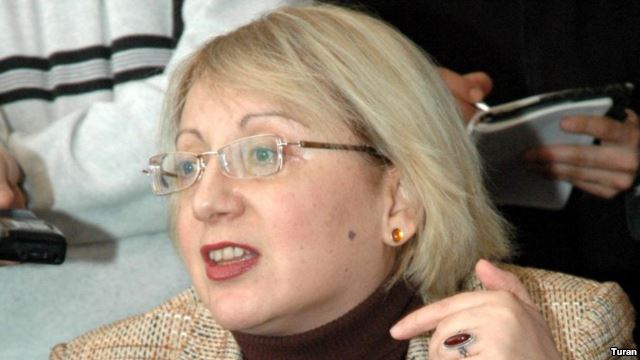
UPDATE 30 July 17:30 pm
Leyla Yunus has been charged with “high treason (article 274), tax evasion (article 213), illegal entrepreneurship (article 192), forged documentation (article 320) and fraud (article 178.3.2)”, reports Meydan TV. She has also been given three months of pre-trial detention, according to Azerbaijani journalist Khadija Ismayilova. Her husband Arif Yunus is reportedly facing two charges; state betrayal (article 274) and fraud.
—
Azerbaijani human rights activist Leyla Yunus has been taken to the prosecutor’s office in Baku for questioning, local media reported.
While on her way to a conference this morning, three men entered her taxi and confiscated her and her driver’s mobile phones. According to her husband Arif Yunus, she is not allowed to see her lawyer.
“It is likely [they] are going to try and arrest her as part of Mirkadirov’s case. It is also likely I too will be arrested,” he told BBC Azerbaijan. He was referring to the case of journalist Rauf Mirkadirov, who was arrested in April and charged with espionage, believed to be linked to his contact with Armenian civil society. Leyla Yunus has spoken out in support of him. Mr. Yunus also said people were trying to break into the couple’s apartment this morning.
Leyla Yunus is the director of the Peace and Democracy Institute, which among other things works to establish rule of law in Azerbaijan. She has previously been targeted by authorities, including in April, when she and her husband were detained when trying to board a flight from Baku to Doha, Qatar. Azerbaijan has a notably poor record on human rights and civil liberties. According to recent figures, there are a 142 political prisoners in the country.
This article was posted on July 30, 2014 at indexoncensorship.org
8 May 2014 | Azerbaijan, Azerbaijan News, Europe and Central Asia, News and features
This week eight young Azerbaijani activists were sentenced to between six and eight years in jail. The members of the N!DA Youth Movement, which works for democracy and social change, were convicted for possession of drugs and explosives, and for intending to “cause public disorder”. The charges are widely believed to be trumped up, and the trials have been criticised by foreign observers over “irregularities” and “shortcomings”, including inconsistencies in testimonies and mishandling of evidence.
This is just the latest addition to a long list of human rights abuses by authorities in the oil rich country. As the repression has largely been allowed to take place away from international attention, this is a good moment to remember a few things about Azerbaijan, especially as the country prepares to take over a six month chairmanship of the Council of Europe’s Committee of Ministers.
1) The six are far from the only political prisoners in Azerbaijan
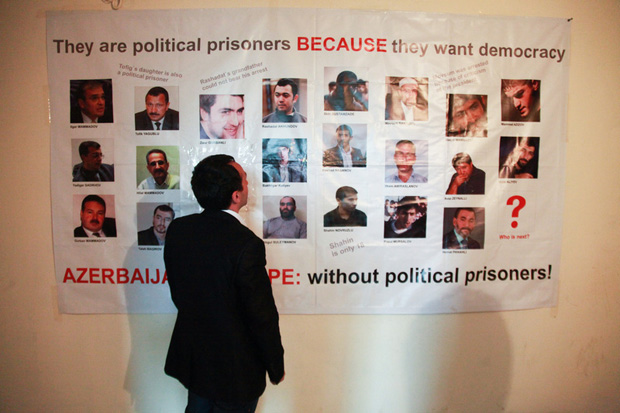
(Image: Aziz Karimov)
According to the latest figures, there are 142 political prisoners in Azerbaijan today. These include human rights defenders, youth activists, and a large number of religious activists, among others. There are currently 17 people serving life sentences. Ahead of the country’s presidential election last October, candidate Ilgar Mammadov was arrested. In March, he was sentenced to seven years in prison for “organizing mass disturbances” and “resisting the police”. Meanwhile, President Ilham Aliyev insists that there are no political prisoners in Azerbaijan.
2) You may escape imprisonment, but you could still face violence and intimidation
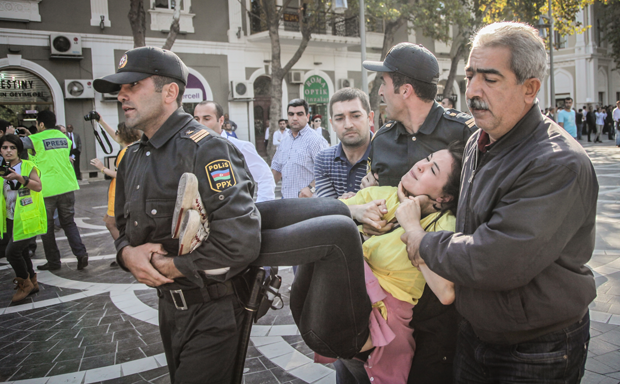
(Image: Aziz Karimov)
Attacks, threats and intimidation are regular occurrences for political opponents, activists and press in Azerbaijan. Following protests in the capital Baku as Aliyev secured his third consecutive term in power last October, demonstrators were beaten and detained by police. Police also raided the offices of independent Election Monitoring and Democracy Studies Centre (EMDSC) which reported irregularities in the election. In 2012, reporter Idrak Abbasov was brutally beaten when filming the demolition of a house by the State Oil Company of Azerbaijan, allegedly by employees of the company and police. The same year, fellow journalist Khadija Ismayilova, known for covering corruption among the country’s powerful elite, was blackmailed with intimate images of her and her boyfriend. She continues to face intimidation today. These abuses are often allowed to happen with impunity.
3) Independent and critical media are under threat

(Image: Alex Brenner for Index on Censorship)
Azerbaijan’s critical press have long been subjected to an array of attacks. Independent news outlets face economic sanctions, and are often barred from distribution networks. Some 70% of distribution is controlled by the government. Most of the nine national TV channels are either directly owned by the state or controlled by the authorities. Journalists also fall victim to legal threats. In the first six months of 2013, 36 defamation suits were brought against media outlets or journalists, four of which were criminal defamation suits. One victim of this hugely restrictive media environment is leading independent paper and Index Award winner Azadliq. The paper has been hit with £52,000 worth of fines following defamation suits, state-owned press distribution company Gasid has not been transferring payments that reflect the paper’s sales. Azadliq claims Gasid owe them some £44,000.
4) Authorities are on an ongoing PR mission

(Image: Zeljko Joksimovic/Wikimedia Commons)
While the situation inside the country shifts between bad and worse, authorities have focused their attentions on a wide-reaching international PR campaign. Ahead of hosting the Eurovision Song Contest, authorities ordered urban renewal that saw houses demolished and families evicted. Vast sums have in recent years been poured into the radical regeneration and beautification of Baku, and there’s more to come. There is also the posh London bar Baku, owned by the Aliyevs; the glossy, internationally distributed Baku magazine, edited by first daughter Leyla and co-published by Conde Nast; and the sponsorship deal with Champions League finalists Atlético Madrid. Next year, Baku will again play host to a prestigious international event — the inaugural European Games.
5) They are about to take charge of one of Europe’s most important human rights bodies
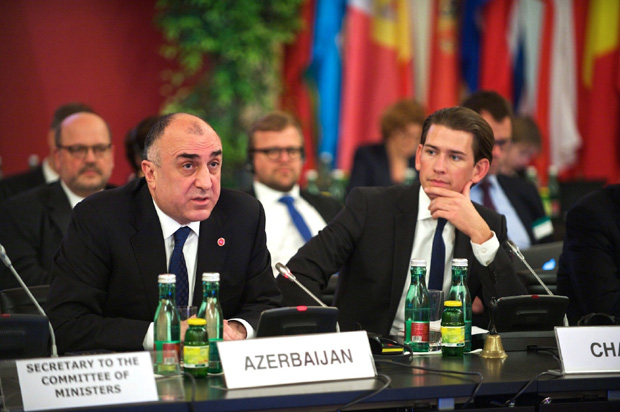
(Image: Sandro Weltin/Council of Europe)
“The Committee of Ministers supervises the execution of judgments of the European Court of Human Rights the Council of Europe…The Committee of Ministers’ essential function is to ensure that member states comply with the judgments and certain decisions of the European Court of Human Rights,” the Council of Europe declare on their website. Next week Azerbaijan will assume the chairmanship of this very Committee of Ministers. But one could say that COE is only sticking to form in its relationship with the country. Only last year, a majority in its Parliamentary Assembly (PACE) voted down a resolution on the existence of political prisoners in Azerbaijan.
This article was originally published on 8 May 2014 at indexoncensorship.org










